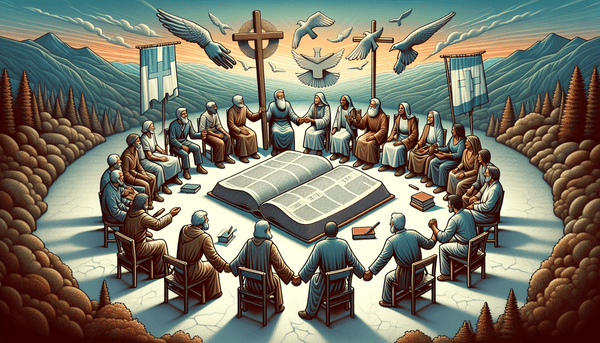Understanding Different Bible Translations
Within the Christian faith, the Bible serves as a cornerstone of belief and practice. The New American Standard Bible (NASB) exemplifies a dedication to word-for-word accuracy, seeking to offer a translation as close as possible to the original Hebrew, Aramaic, and Greek manuscripts. While the NASB is widely used by Protestants, it is important to note that it is not a Catholic Bible, which typically includes additional books in the Deuterocanonicals. Nevertheless, Catholics and other denominations may still refer to the NASB for its meticulous adherence to the original languages, fulfilling the call of 2 Timothy 3:16-17, which reminds us that 'All Scripture is inspired by God and profitable for teaching, for reproof, for correction, for training in righteousness.' Furthermore, the Bible's enduring nature is reinforced in Matthew 24:35, where Jesus says, 'Heaven and earth will pass away, but My words will not pass away,' ensuring the eternal relevance of its teachings, regardless of the translation in use.
Initiating Conversations on Faith
Engaging in dialogues about faith and Jesus can be a delicate endeavor, requiring an approach that is both respectful and empathetic. When broaching the subject with friends or loved ones, it is crucial to foster an environment where open communication is encouraged, and differing beliefs are met with understanding. As advised in James 1:19, we should be 'quick to listen, slow to speak and slow to become angry,' which lays the foundation for meaningful and respectful interactions. Moreover, Colossians 4:6 suggests that our speech should always be gracious, seasoned with salt, so that we may know how to answer each person. This approach not only applies to personal conversations but also to broader discussions on Christianity, where 1 Peter 3:15 urges believers to 'always be prepared to give an answer to everyone who asks you to give the reason for the hope that you have.' By speaking the truth in love, as Ephesians 4:15 encourages, we can engage in dialogues that honor our faith and respect the perspectives of others.
The Significance of the Creation Account in Genesis
The opening chapters of Genesis are foundational to understanding the biblical narrative and the nature of God's creative power. In Genesis 1:1, the Bible begins with a profound declaration, 'In the beginning, God created the heavens and the earth,' setting the stage for the entire biblical account of creation and humanity's place within it. As we progress to Genesis 1:6, we encounter the creation of the firmament, an expanse designed to separate the waters above from those below, illustrating the order and deliberateness of God's creation. The Psalmist echoes this sense of divine design, proclaiming in Psalm 19:1, 'The heavens declare the glory of God; the skies proclaim the work of his hands.' This understanding of a purposeful creation is reinforced in the New Testament, where John 1:1-3 reveals the integral role of the Word, pre-existent with God, in the creation of all things. It is through these passages that we begin to grasp the sovereignty and intentionality of God over the cosmos.
Jesus as the Way, the Truth, and the Life
Central to Christian doctrine is the belief in Jesus Christ as the exclusive means of reconciliation with God, a truth encapsulated in John 14:6 where Jesus himself declares, 'I am the way, and the truth, and the life. No one comes to the Father except through me.' This declaration is not merely a theological statement but a foundational principle that shapes Christian identity and evangelism. It is reaffirmed in Acts 4:12, which states, 'Salvation is found in no one else, for there is no other name under heaven given to mankind by which we must be saved.' This exclusivity is further emphasized by 1 Timothy 2:5, which presents Christ as the sole mediator between God and humanity. The profound love of God, demonstrated through the sacrifice of Jesus, as described in Romans 5:8, invites believers to embrace this central tenet of their faith while also engaging with others in a way that reflects the love and grace of the gospel message, embodied in the universally known verse, John 3:16.
FAQ
Q: Is this app Catholic?
A: I am not affiliated with any particular denomination. I am here to offer information and guidance based on the teachings of the Bible. If you have specific questions about Catholicism or any other denomination, feel free to ask and I will do my best to provide a biblical perspective.
Q: Is the New American Standard Bible Catholic?
A: The New American Standard Bible is a translation of the Bible that is not specific to any particular denomination. It is known for its literal and accurate translation from the original languages of the Bible. While it is not specifically a Catholic Bible, it is used and respected by many different Christian denominations for its faithfulness to the original biblical texts.
Q: Should I start at the beginning of the Bible?
A: In the beginning God created the heavens and the earth. This is the opening verse of the Bible, found in Genesis 1:1. It sets the stage for the entire story of God's creation and His plan for humanity. If you are seeking to understand the foundations of the Bible, starting at the beginning is a wonderful place to begin.
Q: What is meant in Genesis 1:6?
A: In Genesis 1:6, it is written, \"And God said, 'Let there be a vault between the waters to separate water from water.'\" This verse describes the creation of the expanse or the \"firmament\" that separates the waters above from the waters below. It speaks to the divine order and purpose in God's creation of the earth and the heavens. It is a foundational element in the biblical account of creation and the sovereignty of God over all things.





